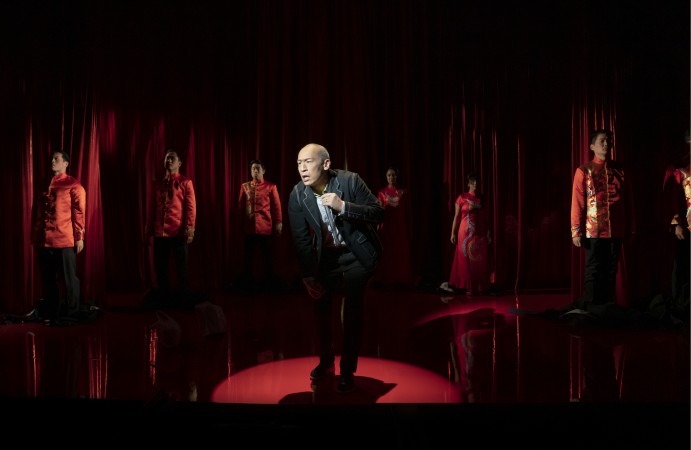* * *
Talk about timing: “Soft Power,” the new David Henry Hwang-Jeanine Tesori musical about Chinese-American cultural diplomacy, has opened at the exact moment when relations between the Trump administration and mainland China have become impossibly fraught. The deftness with which Mr. Hwang and Ms. Tesori juggle reality and fantasy can’t help but put you in mind of the real world, in which two deeply dissimilar cultures, one of them a democracy weathering a populist convulsion and the other an order-worshipping authoritarian state, seek to come to profitable terms with each other.
If that doesn’t sound much like a good old-fashioned Broadway musical…well, neither did Stephen Sondheim’s “Pacific Overtures” back in 1976. And while I’m not quite ready to call “Soft Power” a Sondheim-quality masterpiece after a single viewing, I can already say that I don’t remember when I last saw a musical that was this smart—and touching.

Mr. Hwang and Ms. Tesori describe “Soft Power” as “a play with a musical.” DHH (Francis Jue), the protagonist of the play, is Mr. Hwang, more or less, and the musical around which the play is wrapped is a fevered dream that he has after being stabbed in the neck by a thug and nearly dying (which really happened to Mr. Hwang). In the show, DHH is invited by Xūe Xíng (Conrad Ricamora), a Shanghai theatrical producer, to turn a hit Chinese movie romcom called “Stick to Your Mistake” (yes, it’s imaginary, and it sounds better in Chinese) into a Broadway musical that will be, like Mr. Hwang’s own “Aida,” a “world-wide smash.” DHH doesn’t find the proposition practical: In the film, a married couple pulled apart by love decides to stay together instead of pursuing individual happiness, a Chinese-style denouement that is nothing like that of a Broadway show. Still, a job’s a job, so he goes to work anyway, discovering in the process that Xūe is caught up in an extramarital relationship similar to the one portrayed in “Stick to Your Mistake.”…
That’s where the musical comes in. What Xūe wants DHH to do is write a show that will persuade Western viewers of the superiority of the Chinese way. “What a truly great civilization achieves,” he explains, “is ‘soft power’—through our ideas, inventions, culture—to change the way people think.” This, Xūe believes, is what such great Broadway musicals of the past as “The King and I” have done, and his hope is that “Stick to Your Mistake” will similarly “bring Chinese values to the world.”
So what kind of musical does DHH dream up in his delirium? A crazy parody of “The King and I” in which Xūe and Zoe (Alyse Alan Louis), his American mistress, play the principal characters….
* * *
Read the whole thing here.A montage of scenes from Soft Power:


